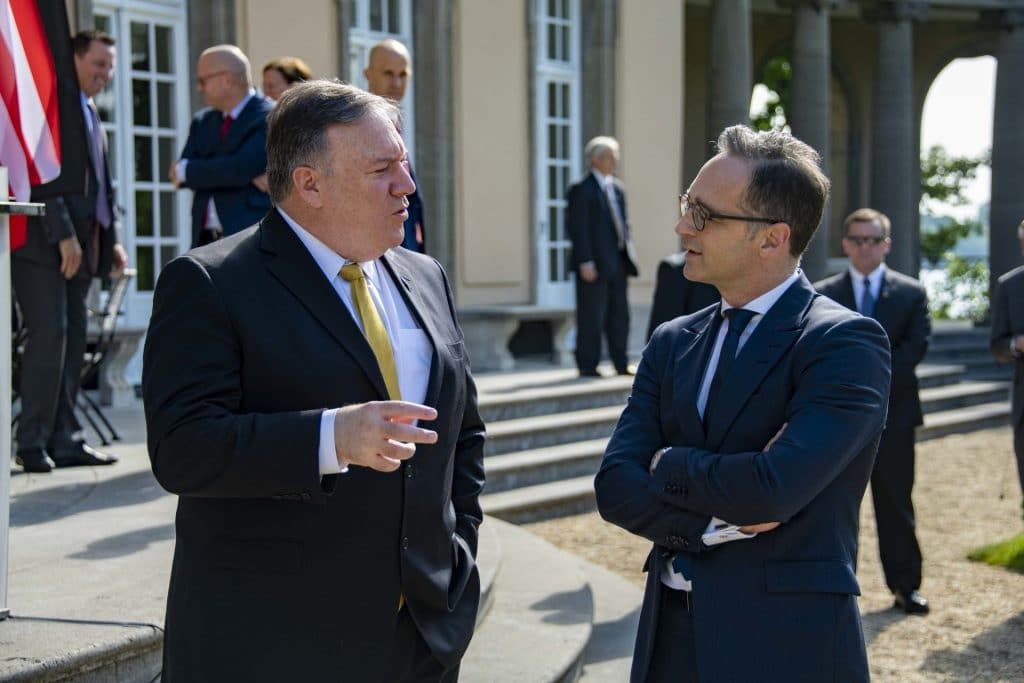Why Europe needs to push back to save the Iran nuclear deal
By Azadeh Zamirirad, Oliver Meier, Sascha Lohmann | June 30, 2020
 Mike Pompeo meets with Heiko Mass, the German foreign minister, in Berlin, 2019. This month, Germany will hold the presidency of both the UN Security Council and the Council of the European Union. Photo credit: US State Department.
Mike Pompeo meets with Heiko Mass, the German foreign minister, in Berlin, 2019. This month, Germany will hold the presidency of both the UN Security Council and the Council of the European Union. Photo credit: US State Department.
As Germany is assuming the double presidencies of the UN Security Council and the Council of the European Union in July, it is facing an uphill battle to ensure that the 2015 Joint Comprehensive Plan of Action, colloquially known as the Iran nuclear agreement, will have a life beyond its fifth anniversary on July 14. Two years ago, the Trump administration ceased its participation in the agreement and reimposed unilateral sanctions as part of a strategy of “maximum pressure.” As that policy has failed to yield the desired results, Washington now seems ready to dismantle the nuclear agreement once and for all by misusing a UN-designated procedure enshrined in the very same nuclear agreement that it left in 2018.
Germany and its European partners should openly resist the Trump administration’s strong-arm tactics. This provides the best chance to keep the Iran deal alive, protect the legitimacy of the UN Security Council, and prevent another nuclear proliferation crisis.
In a remarkable political stunt, the US State Department announced in April that the United States is still a “participant state” of the nuclear agreement. Washington claims to have the same rights as the remaining parties—the permanent UN Security Council members plus Germany—without assuming any of the responsibilities the accord places upon them. By this twisted logic, the US would have the authority to unilaterally trigger a “snapback” mechanism, through which all previous nuclear-related UN resolutions and sanctions against Iran would be reinstated.
Europeans, initially flabbergasted by Washington’s attempt to have its cake and eat it too, have begun to find their voice. In a June 19 joint statement, Germany, France and the United Kingdom declared that they “would not support” a unilateral attempt to trigger snapback. For a long time, Europeans had naïvely believed the US administration’s repeated proclamations that it had exited the deal for good. Now they are coming to terms with the fact that they are in an open conflict with Washington.
The recent news revolves around a UN arms embargo against Iran, which is set to expire in October, potentially allowing Iran to import conventional weapons from countries like Russia and China. The US has shared a draft resolution with members of the Security Council aimed at extending the embargo indefinitely. This poses a problem given that the mid-October expiration date is an agreed part of Security Council resolution 2231, the legal framework of the nuclear deal.
Perpetuating the UN embargo would deal a heavy blow to the nuclear agreement, as Iran has rejected any one-sided modifications. Tehran has a variety of instruments at its disposal with which to respond, such as enriching uranium to 20 percent or beyond, decreasing its cooperation with the International Atomic Energy Agency, or even getting out of the Nuclear Non-Proliferation Treaty altogether.
For its part, the US has threatened to trigger snapback should its motion on the arms embargo not pass in the Security Council, where it faces heavy opposition from Russia and China. Thus, Washington is giving the Security Council, including its own allies, an impossible choice: Vote with us or else face snapback. Both scenarios would potentially pave the way for a total collapse of Europe’s biggest nonproliferation achievement to date.
Killing the deal by cherry-picking a procedure from an agreement the United States has already left would have far-reaching implications for the overall validity of UN Security Council resolutions. Other countries like China or Russia might feel emboldened to implement resolutions selectively as well. Furthermore, it would leave the Security Council in an unprecedented state of uncertainty over which resolutions to follow. While Washington would insist on reinstating previously lifted sanctions, Russia and China are likely to simply ignore snapback and stick to resolution 2231.
So far, the Trump administration seems undeterred by European statements. It appears the European members need to raise the stakes to make it impractical for the US administration to blatantly misuse the nuclear deal’s provisions. Both Russia and China have already rejected the US claim that it is still a participant state with a right to trigger snapback. Europeans now need to lay out the specifics of their own dismissal.
Germany, France, and the United Kingdom should declare that the US has forfeited its participant status and associated rights when it stopped implementing the deal in 2018. In addition, they should pursue a precautionary approach by stating that they will not implement any nuclear-related UN sanctions reinstalled at the behest of a non-participant state. Efforts should be coordinated with other EU member states as well as with members of the UN Security Council. To this end, Germany could use its presidency at the Security Council and the Council of the European Union in July to build broad international support. Lastly, they need to make it known that they will legally counter any actions to force an illegitimate process upon the Security Council by taking the case to the International Court of Justice.
Pushing back outspokenly would certainly be a deviation from usual European diplomacy. However, the potential damage the Trump administration could inflict on the legitimacy of the Security Council is substantial, and extends far beyond the Iran case.
Notwithstanding the difficulties at hand, transatlantic cooperation on Iran is still possible. While there has been bipartisan support in Congress for extending the arms embargo, it has also urged the US administration to “work with allies.” Europeans are already thinking about ways to reach a compromise. They could, for instance, pursue a code of conduct for future arms sales as an alternative to an extension of the embargo. However, any European willingness to find common ground should be met with an acknowledgement by the Trump administration that the United States is in fact no longer a participant in the deal. Otherwise, Washington can continue to raise the spectre of snapback as leverage against its own allies.
A more assertive approach will add to Europe’s credibility and strengthen its position on many fronts. It will increase the likelihood that Iran will take steps to return to full compliance with its nuclear commitments, as talks with the remaining parties of the deal continue in the framework of the nuclear agreement’s dispute resolution mechanism. At the same time, a principled stance by Europe would pay off regardless of the outcome of the US presidential elections. If Joe Biden wins the election, Europeans will have kept the door open for a US return to the nuclear deal. If, however, Trump is re-elected, Europe will have taken a step long overdue to protect itself from further coercive action.
Together, we make the world safer.
The Bulletin elevates expert voices above the noise. But as an independent nonprofit organization, our operations depend on the support of readers like you. Help us continue to deliver quality journalism that holds leaders accountable. Your support of our work at any level is important. In return, we promise our coverage will be understandable, influential, vigilant, solution-oriented, and fair-minded. Together we can make a difference.
Keywords: Europe, Iran, Iran nuclear deal, JCPOA, UN Security Council, United States, economic sanctions, joint comprehensive plan of action
Topics: Nuclear Risk

















